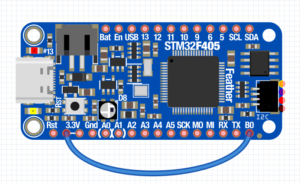I choose to use Circuit Python for programming the custom part of my payload, for convenience: the vendor of my nontraditional components offers free code libraries and technical support for the layperson.
I am placing links to the code tutorial pages for each relevant component here, for my own convenience:
- Temp, humidity
- magnetometer, gyro, accelerometer
- microcontroller, datalogger
- CO2, temp, humidity
- particulate matter
First, the microprocessor board needs firmware to be uploaded via USB to its flash memory. To enable this feature, I must connect the B0 pin on the board to the 3.3V pin,

and then press the Reset button on the board, while it is connected to my PC’s USB. I will find the microcontroller board listed in the Device Manager in the Windows operating system of my PC, under USB / Serial Devices. The detailed instructions for uploading the firmware are linked here.
After firmware upload, the microcontroller board will show up on my PC as a new drive called “CIRCUITPY.”
I will find the /CIRCUITPY/lib directory in the microcontroller board, and upload the code libraries that I will need. If the microcontroller board has plenty of flash space, then I will simply upload all of my vendor’s CircuitPython libraries. After that I will be able to upload my python program.